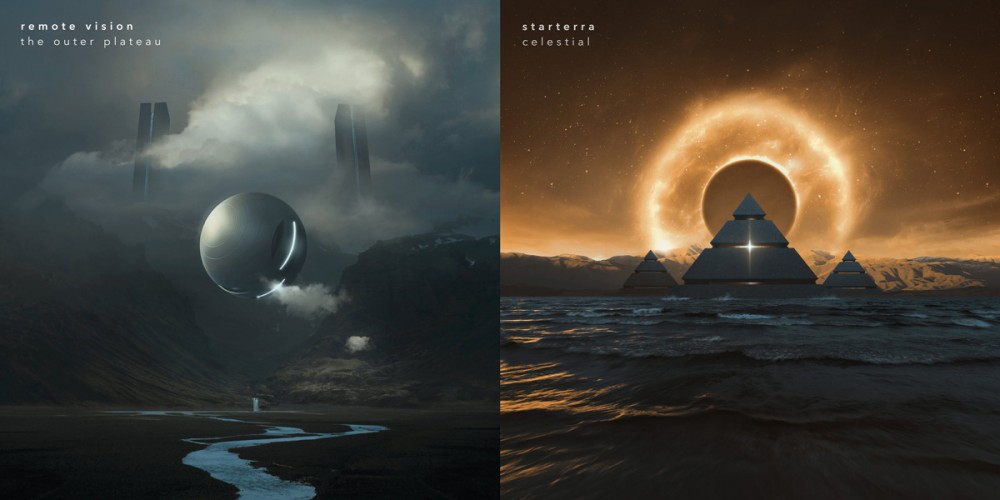Being a fan of The Mars Volta can be a bit of a polarizing thing, depending on the company you find yourself in. Formed by close friends and collaborators Cedric Bixler-Zavala and Omar Rodríguez-López after the demise of their beloved El Paso, Texas, post-hardcore outfit At The Drive-In, the band spent much of their initial decade-long run challenging fans who chose to follow them into their unique, reality-bending dream world.
Certain diehards will err on the side of At The Drive-In purism, even going to bat for the other side of their implosive split favoring Sparta, which is helmed by ATDI guitarist Jim Ward, and features the band’s rhythm section of drummer Tony Hajjar and bassist Pablo J. Hinojos-Gonzalez. Those fans show their true colors in a sense, as Sparta kept up the meat-and-potatoes post-hardcore mantle of the two projects. The Mars Volta, however, found both Rodriguez-Lopez and Bixler-Zavala indulging in brain-melting psychedelia and extended, labyrinthian prog-rock exercises that filled their six full-length albums.
I had my first experience with the group as an impressionable and unsuspecting teen, catching the band opening for The Red Hot Chili Peppers and Queens of The Stone Age at the since-rebranded Times Union Center in Albany, New York, back in 2003. The show was just a month before the release of their debut album Deloused in the Comatorium and with this being in the pre-WiFi is all around us days, I was completely unaware that the two curly-haired balls of energy from ATDI had a new band they had been working on, let alone had released their Tremulant EP the previous year. It’s easily forgotten that since nü metal and pop punk were the chosen flavors of guitar music getting played on mainstream radio and MTV in the early 2000s, ATDI was really the only gateway for kids from rural areas to get into post-hardcore in its most unbastardized form. Without an album like Relationship of Command or the grainy tour-doc music video of “One Armed Scissor” getting constant play, I don’t know if my brain would have ever opened up to bands like Fugazi or Nation of Ulysses.
But what Rodriguez-Lopez and Bixler-Zavala were able to accomplish in The Mars Volta took things one step further. Unafraid to make honest-to-Pete epics full of dense mysticism that could inspire countless Magic :The Gathering expansion sets, they shrugged off any notion that they had to conform with the rest of the post-hardcore scene. They were now incorporating elements of Glenn Branca and John Zorn’s challenging no wave, Afro-Cuban jazz and funk, and the freeness of CAN into their die on the stage brand of punk. Furthermore, they were shutting down the notion that the challenging time signatures and studio experimentation of prog-rock innovators like King Crimson and Peter Gabriel-era Genesis were to be shunned by alternative-rock radio.
The band called it quits after touring behind their sixth album Noctourniquet back in 2012, but have returned this year with a pair of singles from a yet-to-be-announced album and a tour set for this fall. We reached inside the vault and have emerged with a proper ranking of their six full-length studio albums.
6. Octahedron (2009)
Coming a year after the release of The Bedlam in Goliath, The Mars Volta’s fifth album Octahedron continues on with same condensed-burst formula of that record, but finds inspiration in subtracting even more from their typical frenzy. With only the album’s closer “Luciforms” running over eight minutes and the whole thing running a relatively lean 50 minutes, Ochtahedron is the most svelte album in the Mars Volta’s discography, as well as the band’s most subdued. However, that gamble comes with mixed results. The shakeup in format is admirable, but The Mars Volta work best when they are pushing their arrangements into the red, so to speak. Once it’s over, it’s almost puzzling how instantly palatable the whole experience is. For a band known for holding its hands on the stove for as long as they can, you wish they had tacked one maze-like epic onto the end, just to recertify their typical freaked-out aspirations. With that said, there are certainly highlights on the album. Bixler-Zavala’s vocals on spaced-out epic “Teflon” are some of his finest across any project he has been a part of, and the fierce rager “Cotopaxi” is one of the band’s most compact and no-frills rockers. While Octahedron is not a misstep by any means, it leaves you wondering if they didn’t give themselves enough time to realize the world they had left to conquer.
5. Noctourniquet (2012)
When the first broken synth blasts appear on opener “The Whip Hand,” it’s clear that with their 2012 album Noctourniquet, The Mars Volta were intent on throwing a crayon in the dryer just to see what would happen. The song is perhaps the most “punk in spirit” thing Rodríguez-López and Bixler-Zavala had attempted since they introduced the band, as it brings an unexpected and wickedly brutal industrial sensibility into the fold. It’s equally heart-racing when Bixler-Zavala snarls, “I am a landmine, I am a landmine / So don’t just step on me, so don’t just step on me,” as the music drops out to just drums halfway through. This streak of embracing John Carpenter-influenced synths (“In Absentia”), moments of striking beauty (“Vedamalady,” the title track), bad-trip-in-a-house-of-mirrors mood pieces (“The Malkin Jewel”) and adventurous production techniques from Rodríguez-López throughout gives Noctourniquet a unique place in The Mars Volta’s history. While it may not be as barn-burning or awe-inspiring as their initial run, the album regains a sense of inspired creative abandon that seemed missing or restrained on their previous release. Noctourniquet would also act as their final release before their return with new material this year. In that dormant time for The Mars Volta, the album has only benefited from ample time to digest, making it a true dark horse in their catalog.
4. Amputechture (2006)
After the one-two blast of their first two albums, you would think Bixler-Zavala and Rodríguez-López would give time for the anvil to cool before forging another Mars Volta album. But even though Frances the Mute pushed their mission as a band to thrilling maximalist heights, the band returned just one year later with its follow-up, Amputechture. In ways, the album builds the case for both striking while the iron is hot and for the band needing to take some time away to re-center themselves. The album starts off with a dazzling suite of four songs that seamlessly flow into one cohesive movement. That suite begins with the atmospheric guitar noodling of “Vicarious Atonement” and culminates with the thunderous “Meccamputechture,” which finds Bixler-Zavala raging against the idea that our human bodies are “ornaments” to our souls.
The swells and detours during this opening run are nothing short of thrilling on a musical level, with the band incorporating duel leads from Rodríguez-López and John Frusciante, wailing horns, organ and Bixler-Zavala’s otherworldly falsetto. The only problem here is that the songs aren’t quite as memorable as the material that came just a year prior. The album’s momentum comes to an awkward standstill once it transitions to the somewhat directionless acoustic number “Asilos Magdelena,” which wears out its over-six-minute runtime pretty quickly. There are bright moments in the album’s back half, however, namely “Viscera Eyes,” which finds the band in full-blown Zeppelin stomp mode. The riff in its chorus alone earns Rodríguez-López his shredder bonafides. “Day of Baphomets” starts off with one of the few commendable bass solos in recent rock history, from Juan Alderte, but the group loses the plot as it expands into unnecessary sections. The album comes to a puzzling close with the formless, sitar-laden “El Ciervo Vulnerado,” which clips with a hard edit to announce the album’s conclusion. Overall, Amputechture sounds like a great team trying to perform at a high level with a considerable amount of fatigue, going up to bat with nothing but heart.
3. The Bedlam in Goliath (2008)
This album returns to the barn-burning aggression found on The Mars Volta’s debut. But in the case of “Illyena” and perhaps the album’s mightiest epic, “Goliath,” the band adds an element of paranoid funk that points more towards Maggot Brain than In The Court Of King Crimson. This infusion of groove was what made cuts like “Drunkship of Lanterns” from Deloused and “L’Via L’Viaquez” from Frances the Mute so special, and it was an aspect of the band’s strengths that felt largely missing from Amputechture’s expansive arrangements. The fury and attack hardly let up through the album’s hour-plus runtime, ensuring it as an album that shouldn’t be listened to in the car passing through speed trap towns. The band is at absolute peak performance on “Ouroboros,” with new full-time drummer Thomas Pridgen demolishing his kit with the fury of pre-teen receiving a notice to attend summer school. Even though the album was reportedly a pain in the neck to record, with many studio hiccups along the way, listening to The Bedlam In Goliath, you get a sense of rekindled purpose from the band. Their efforts paid off in their first real dose of recognition on a commercial scale, as the blistering single “Wax Simulcra” earned them the Best Hard Rock Performance award at the 2009 Grammys.
2. Deloused in the Comatorium (2003)
This, my friends, is the one that started it all. What makes Deloused in the Comatorium such a monumental listen, and perhaps the favorite Mars Volta record for people of a certain age, is that fans of ATDI’s Relationship of Command could easily see where Rodríguez-López and Bixler-Zaval could have gone if they’d stayed on that creative trajectory. But its biggest strength is that the album’s ferocity and relatively lean attack from the band—as hilarious as that sounds—makes it the perfect bridge between the two projects, highlighting what made Rodríguez-López and Bixler-Zavala stick out from their old band. Their strengths and eccentricities are only heightened. Rodríguez-López’s post-punk arpeggios in ATDI seem neutered in comparison to the guitar heroics found here. The colossal “Roulette of Dares” and the guns-at-dawn six-string duel in the middle of “Cicatriz ESP” show that his playing is just as influenced by John Reis’ demonic surf riffs in Drive Like Jehu as it is by free jazz legend Sonny Sharrock’s god-tier fretwork on his classic Ask The Ages. Just as sizable a shift, Bixler-Zavala’s vocals had evolved past the guttural yells he had been known for, now reaching daring heights. His newly introduced falsetto stretches to its limits on the opening suite “Son Et Lumiere / Inertiatic ESP” and in the crescendo of the behemoth “Drunkship of Lanterns,” to the point of nearing Björk’s paralyzing vocal peaks. According to the band, the album is a concept record based on the internal journey of a man named Cerpin Taxt, who entered a coma after overdosing on a terrible combo of heroin and rat poison. This story was based on the passing of Bixler-Zavala’s real-life friend, artist and musician Julio Venegas. Given the record’s densely poetic lyrics, the concept can easily elude you upon first listen. After all, “The am trinity fell upon asphyxia-derailed / In the rattles of … / Made its way through the tracks / Of a snail slouching whisper / A half mass commute through umbilical blisters” aren’t the most relatable lyrics you’ll ever hear. But the album’s mysterious and adventurous quality on a musical level carved out a pathway to a psychedelic realm unavailable to them in more regimented and uptight punk spaces. It wasn’t until their next record that they really let their freak flag fly.
1. Frances the Mute (2005)
Sure, The Mars Volta drew on influences from the early days of prog rock with their debut. But it wasn’t until their follow-up that they delivered a self-assured entry into the genre that could be pointed to as a meaningful continuation of its lineage. It’s also perhaps the only point in time where the band’s ambition to innovate was equally balanced with a self-awareness of what would get asses in the cheap seats. Hell, even Genesis had a knack for rolling out a pop tune like “I Know What I Like (In Your Wardrobe)” at the height of their experimental powers. Between the feverish rockers, like the towering 13-minute opener, and the Afro-Cuban-influenced funk stomp of the half-Spanish-sung “L’via L’Viaquez,” drummer Jon Theodore deserves all the flowers in the world. But the album’s first single “The Widow” is perhaps the band’s biggest attempt at unabashed classic-rock grandeur. “Free from” any post-hardcore signaling, “free from” all the shame of attempting lasting greatness. The funeral march ballad carries enough black magic in its anthemic chorus to match Led Zeppelin’s most dazed and confused moments, with Bixler-Zavala wringing out each syllable with his emotive wail. Even the album’s two connected juggernaut musical movements, “Miranda The Ghost Just Isn’t Holy Anymore” and “Cassandra Gemini”—which are both divided into multiple distinct parts and tally up a lengthy 30-minute runtime—stick the landing with no need for justification. The band mesmerize as they crank up and relieve the pressure over and over, until the album’s thrilling conclusion. If both Rodríguez-López and Bixler-Zavala seemed hesitant to give themselves over to this kind of lavish prog world-building with The Mars Volta in the beginning, Frances the Mute is the record that revealed the band’s third eye.
Pat King is a Philadelphia-based journalist and host of the In Conversation podcast at Ears to Feed. He releases his own music with his project Labrador and is a tireless show-goer and rock doc fanatic. He recently took up long-distance running, which he will not shut up about. You can follow him at @MrPatKing.




